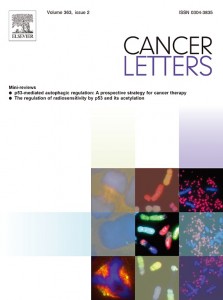 There’s been a 10th retraction from two former postdocs at a UT-Southwestern cancer research center who were sanctioned by the Office of Research Integrity (ORI) last September, in part due to observations and comments from Retraction Watch readers.
There’s been a 10th retraction from two former postdocs at a UT-Southwestern cancer research center who were sanctioned by the Office of Research Integrity (ORI) last September, in part due to observations and comments from Retraction Watch readers.
It’s a 2008 Cancer Letters paper, “Methylation of apoptosis related genes in the pathogenesis and prognosis of prostate cancer,” retracted at the request of Makoto Suzuki, the first author who has claimed responsibility for falsifying data in this and five other papers.
You can see our full coverage of the events here, including the role RW readers played in uncovering the misconduct.
Suzuki, now at Kumamoto University Hospital in Japan, conducted the misconduct while a postdoc in the lab of Adi Gazdar at UT-Southwestern in Dallas. Around the same time, another postdoc in the same laboratory, Takao Takahashi, falsified data in four papers.
In this case, the paper was pulled for falsification of a western blot of the methylation of four genes in prostate cancer. The full retraction notice reads:
This article has been retracted at the request of the first Author, who accepts responsibility. Following an internal review at the UT Southwestern Medical Center in Dallas, evidence has been found of improper manipulation and duplication of Figure 1 in this article.
The ORI delivered their ruling on Suzuki, citing falsification in this paper, in September 2014, but the paper was only now retracted. The paper has been cited 42 times, according to Thomson Scientific’s Web of Knowledge.
We’ve reached out to Suzuki and Cancer Letters editor-in-chief Manfred Schwab at Deutsches Krebsforschungszentrum (DKFZ) in Germany for any additional details, and will update if we hear back.
If Drs. Takahashi and Suzuku were post-doc fellows at USW, what sanctions. if any were applied to the “mentors”: or USW for failure to identify and/or prevent the misconduct. They were described by ORI as:having, :”Engaged in research misconduct by knowingly, intentionally, and recklessly falsely reporting the results of RT-PCR experiments….”
Between them, they published ten papers which were retracted While their specific status is unclear, they were supported by Federal funds.If they were fellows, what action has USW taken against their “mentors”: ?If not fellows but, Foreign Scientists, they were also supported by Federal funds. In either case, should USW not be held responsible to some degree and required to return the taxpayer funds which produced 10 retracted papers ?
Don Kornfeld
Don, as you know, ORI cannot and does not sanction PI’s in whose laboratory postdocs and graduate students committed research misconduct (without the knowledge or direction of the PI), Under the regulations, ORI can only sanction the person who committed the misconduct.
Likewise, NIH alone or as the funding agency can try to recover funds from grants (ORI cannot do so). However, NIH seldom tries to pursue such recovery of grant funds (NIH would have to prove what fraction of the grant award was potentially recoverable because of the misconduct). Indeed, grants are given as assistance (not as contracts for specific products). Many NIH grants may not produce significant positive results, but NIH does not try to recover funds from them either.